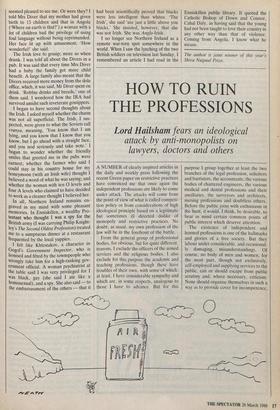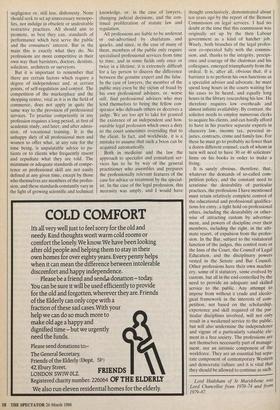HOW TO RUIN THE PROFESSIONS
Lord Hailsham fears an ideological
attack by anti-monopolists on lawyers, doctors and others
A NUMBER of clearly inspired articles in the daily and weekly press following the recent Green paper on restrictive practices have convinced me that once again the independent professions are likely to come under attack. The attacks will come from the point of view of what is called competi- tion policy or from considerations of high ideological principle based on a legitimate but sometimes ill directed dislike of monopoly and restrictive practices. No doubt, as usual, my own profession of the law will be in the forefront of the battle.
From the general group of professional bodies, for obvious, but for quite different, reasons, I exclude the officers of the armed services and the religious bodies. I also exclude for this purpose the academic and teaching professions, though these have troubles of their own, with some of which, at least, I have considerable sympathy and which are, in some respects, analogous to those I have to advance. But for this purpose I group together at least the two branches of the legal profession, solicitors and barristers, the accountants, the various bodies of chartered engineers, the various medical and dental professions and their ancillaries, the surveyors and architects, nursing professions and doubtless others. Before the public joins with enthusiasm in the hunt, it would, I think, be desirable, to bear in mind certain common points of public interest which deserve attention.
The existence of independent and learned professions is one of the hallmarks and glories of a free society. But they labour under considerable, and occasional- ly damaging, misunderstandings. Of course, no body of men and women, for the most part, though not exclusively, self-employed and supplying services to the public, can or should escape from public scrutiny and, where necessary, criticism. None should organise themselves in such a way as to provide cover for incompetence, negligence or, still less, dishonesty. None should seek to set up unnecessary monopo- lies, nor indulge in obsolete or undesirable restrictive practices. All should aim to promote, as best they can, standards of performance which best serve the public and the consumers' interest. But in the main this is exactly what they do. No professions are more competitive in their own way than barristers, doctors, dentists, solicitors, architects or surveyors.
But it is important to remember that there are certain factors which require a degree of independence and, at certain points, of self-regulation and control. The competition of the marketplace and the shopping centre, vital as it is in the field of commerce, does not apply in quite the same way to the provision of professional services. To practise competently in any profession requires a long period, at first of academic study, and later, and after admis- sion, of vocational training. It is the unhappy duty of all professional men and women to offer what, at any rate for the time being, is unpalatable advice to pa- tients or to clients who frequently resent and repudiate what they are. told. The minimum or adequate standards of compe- tence or professional skill are not easily defined at any given time, except by those who themselves are members of the profes- sion, and these standards constantly vary in the light of growing scientific and technical
knowledge, or, in the case of lawyers, changing judicial decisions, and the con- tinual proliferation of statute law and regulation.
All professions are liable to be undercut or out-advertised by charlatans and quacks, and since, in the case of many of them, members of the public only require specialised professional services from time to time, and in some fields only once or twice in a lifetime, it is extremely difficult for a lay person to discern the difference between the genuine expert and the false. In the case of lawyers, the member of the public may even be the victim of fraud by his own professional advisers, or, worse still, find professional advisers who may lend themselves to being the fellow con- spirator who defrauds others or deceives a judge. We are too apt to take for granted the existence of an independent and hon- ourable legal profession which owes a duty to the court sometimes overriding that to the client. In fact, and worldwide, it is a mistake to assume that such a boon can be acquired automatically.
Both in medicine and the law the approach to specialist and consultant ser- vices has to be by way of the general practitioner who assembles and prepares the professionally relevant features of the case for advice or treatment by the special- ist. In the case of the legal profession, this necessity was amply, and I would have thought conclusively, demonstrated about ten years ago by the report of the Benson Commission on legal services. I had no doubt at the time that this commission was originally set up by the then Labour government as a kind of hatchet job. Wisely, both branches of the legal profes- sion co-operated fully with the commis- sion, and, thanks to the integrity, percipi- ence and courage of the chairman and his colleagues, emerged triumphantly from the ordeal. It is, after all, obvious that, if a barrister is to perform his own functions as a specialist adviser and advocate, he must spend long hours in the courts waiting for his cases to be heard, and equally long hours in the library researching his law. He therefore requires low overheads and almost infinite availability. By contrast, the solicitor needs to employ numerous clerks to acquire his clients, and can hardly afford to have in his practice separate experts in chancery law, income tax, personal in- juries, contracts, crime and family law. For these he must go to probably no fewer than a dozen different counsel, each of whom in turn will need to have 30 or 40 solicitors' firms on his books in order to make a living.
It is surely obvious, therefore, that, whatever the demands of so-called com- petition policy, and 'the constant need to scrutinise the desirability of particular practices, the professions I have mentioned must retain relatively complete control of the educational and professional qualifica- tions for entry, a tight hold on professional ethics, including the desirability or other- wise of attracting custom by advertise- ment, and powers of discipline over their members, including the right, in the ulti- mate resort, of expulsion from the profes- sion. In the Bar, subject to the visitatorial function of the judges, this control rests in the Inns of the Court, the Council of Legal Education, and the disciplinary powers vested in the Senate and Bar Council. Other professions have their own machin- ery, some of it statutory, some evolved by custom, but all in the end controlled by the need to provide an adequate and skilled service to the public. Any attempt to impose from without a crude and ideolo- gical framework in the interests of com- petition, not based on the scholarship, experience and skill required of the par- ticular disciplines involved, will not only result in a weakened service to the public, but will also undermine the independence and vigour of a particularly valuable ele- ment in a free society. The professions are not themselves necessarily part of manage- ment, nor an intrinsic component of the workforce. They are an essential but sepa- rate component of contemporary Western and democratic culture and it is vital that they should be allowed to continue as such.
Lord Hailsham of St Marylebone was Lord Chancellor from 1970-74 and from 1979-87.



















































 Previous page
Previous page